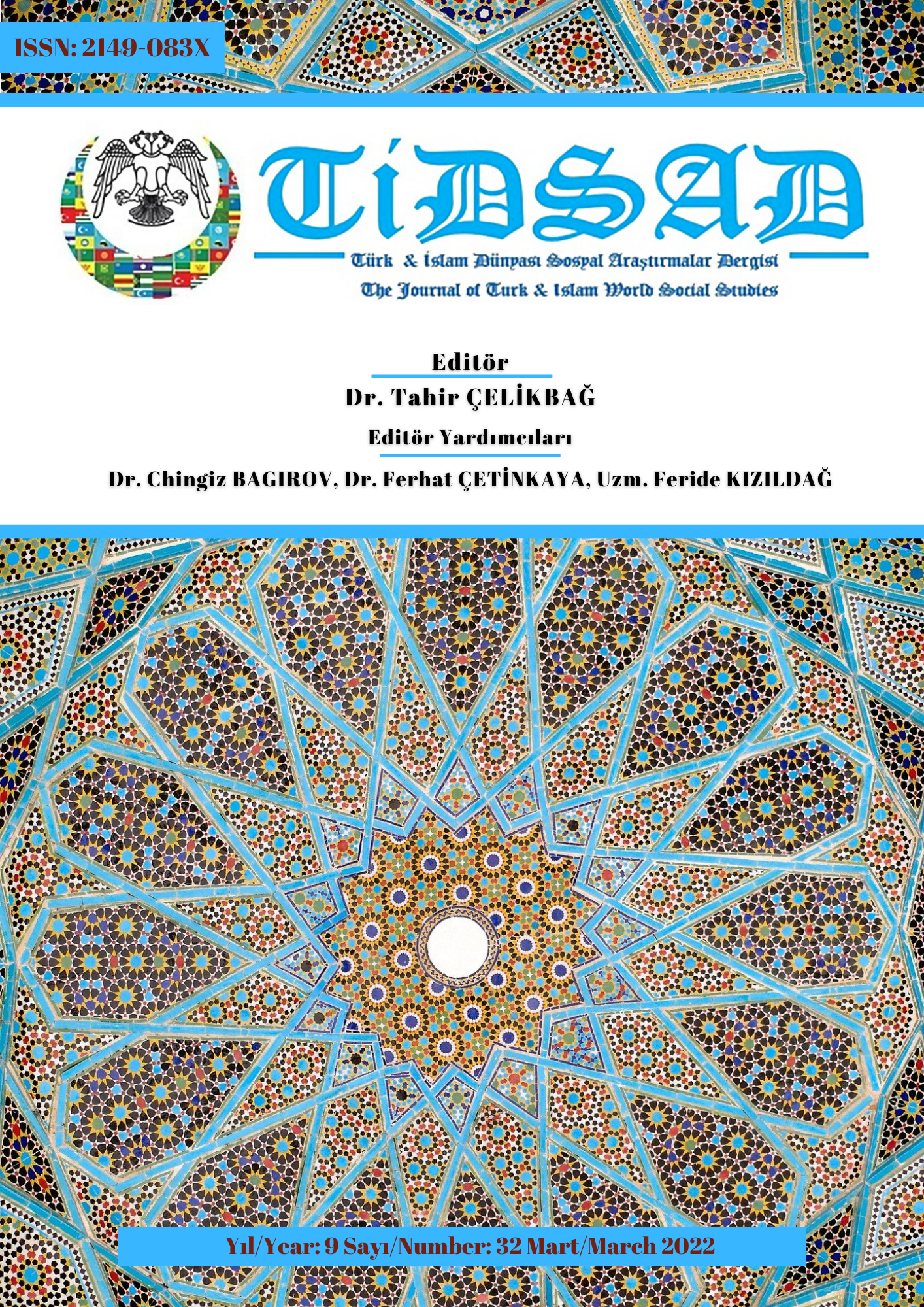Author :
Abstract
Kavimler Göçü ve Batı Roman’ın yıkılışıyla tarih sahnesine çıkıp yedinci asra doğru devletlerini ve kimliklerini kaybederek Germen ve Latin kavimler arasında asimile olan Gotların Avrupa’nın siyasi, ekonomik ve mimari tarihindeki rolleri bilinmektedir. Ancak Gotların Hristiyanlaşmalarına rağmen kendilerine özgü bir Hristiyanlıkları olduğu özellikle de ana gövde Hristiyanlığın en önemli ilkesi olan teslis yorumuna katılmadıkları ve bu hususta ana akım Hristiyanlıkla başa baş bir mücadele yürüttükleri fazla dillendirilmemektedir. Gotlar aynı İncillere sahip oldukları ve Pavlus’un Mektuplarını da muteber gördükleri halde ana akım Hristiyanlığın teslis anlayışını reddetmişlerdir. Bu da ana akım Hristiyanlığın teslis anlayışının mevcut İncillere dayalı olmadığını göstermektedir. Bu bakımdan Wulfila’nın Gotçaya İncil çevirisi ve ana akım Hristiyanlıkla girdikleri teolojik tartışmaları yansıtan eserler teslis inancı ve ana gövde Hristiyanlığın oluşum süreci açısından büyük önem arz etmektedir.
Keywords
Abstract
The role of the Goths in the political, economic and architectural history of Europe. They appeared at the scene of history with the Migration of Nations and the collapse of the Western Roman Empire. Then they lost their states and identity towards the seventh century and assimilated among the Germanic and Latin nations. The role of Goths in politic, economic and architectural History of Europe. However, it is not often mentioned that the Goths, despite their Christianization, have a sui-generis Christianity, especially that they do not agree with the interpretation of the trinity, which is the most important principle of main stream Christianity, and that they fought the Orthodox in this regard. Although the Goths had the same Gospels and considered Paul's Letters to be credible, they rejected the trinity concept of main stream Christianity. This shows that the trinity concept of main stream Christianity is not based on the existing Gospels. In this respect, the Goths translation of the Bible and the works reflecting the theological discussions with the Orthodox are of great importance in terms of the belief in the trinity and the formation process of mean stream Christianity.
Keywords
- Bockmann, R. (2014). The non-archeology of arianism- what comparing cases in cathage, haidra and ravenna can tell us about arian churches. In Guido M. Berndt and Roland Steinacher (Ed.) Arianism: Roman Heresy and Barbarian Creed. Henry Ling Limited.
- Chadwick, H. (2001). The Church in ancient society, from Galilee to Gregory The Great. Oxford University Press.
- Cohen, S. (1983). “Religios Diversity in Ostrogoths”. Erişim Tarihi: 30.01.2020. https://doi.org/ 10.1163/978900 43159 38_020.
- Demirci, K. (2018). Nesturi Hristiyanlık ve Antakya teolojisi. Ayışığı Kitapları.
- Healy, P. (1911). "Priscillianism." The Catholic Encyclopedia. Vol. 12. New York: Robert Appleton Company, Erişim Tarihi: 02.01.2020. http://www.newadvent.org/cathen/12429b.htm
- Hinds, K. (1962). Goths. Marshall Cavendish Corporation Map copyright.
- Ignat, A. (2012). The Spread Out of Arianism, A Critical Analysis of Arian Heresy. Interna- tional Journal of Orthodox Theology, 3(3), 3069. http://orthodoxtheology.com/media/PDF/IJOT3.2012/Ignat.Arianism.pdf
- Isidorus (1970). History of the Goths, Vandals and Suevi (Trans.: Guido Donni & Gordon B. Ford) 2. Basım. E. J. Brill.
- Kaliff, A. (2011). The origins of the Goths – mysterious and misunderstood. international symposium, Uppsala University June 15-18.
- Kostial, N. (2013). Die Annam des Christentums und die Ansiedlung im Imperium am Beispiel der Gothen, Magistra der Philosophie. Universität Wien.
- Krause, T. ve Slocum, J. (2020). Gothic Online, Series Introduction. Linguistic Research Center, The University of Texas at Austin. Erişim Tarihi: 14.03.2020. https://lrc.la.utexas. edu/eieol /gotol
- Larreta, J. M. I. (2019). De Arrianos a Cataros. Gothalaunia, 2016, http://gothalaunia.blogspot.com/p/de-arrianos-cataros_6343.html
- Levy, C. D. (2020). The Arian Christian doctrines: The origins of Christianity. Ed. Institute for Metaphysical Studies Inc, USA, 2010. Erişim Tarihi: 30.10.2020. https: //books. google.bs/ books?id=yP-fIislexUC&printsec= frontcover& source=gbs _atb#v= onepage &q&f=false
- Majocchi, P. S. R. (2014). The lombards and the ghost of Arianism. Roman heresy and bar- barian creed. Erişim Tarihi: 15.01.2019. https://www.academia.edu /8395279/Piero _Majocchi_ Arriano-rum_abolevit_heresem_ the_Lombards_and_the_ghost_of_arianism,
- Mark J. (2014). ‘’Vandals’’. Ancient History Encyclopedia. Erişim Tarihi: 02.06.2014. https://www.ancient.eu/Vandals/
- Marchand, J. (2020). “Auxentius on Wulfila”. Erişim Tarihi: 12.11.2020. https://faculty.georgetown.edu/jod/texts/auxentius.trans.html
- Mirsanu, D. (2011). “For Want to a Better Word; Religious Terms in The Gothic Bible in relation to Greek and Latin (ss. 31-45)”. Centrul de Studii Biblico-Filologice, Erişim Tarihi: 03.02.2011, http://www.diacronia. ro/ro/indexing/details/A7284/pdf\
- Munkammar, L. (2011). “Wulfila, the Goths and the Bible”. International Symposium, Uppsala University June, 15-18.
- Nofziger, C. J. (2012). Reign of heretics: Arianism and political power in the Vandal and Ost- rogothic kingdoms. WWU Graduate School Collection. Erişim Tarihi: 17.12.2021. https://cedar.wwu.edu/wwuet/244
- Philostorgius, (2007). Ecclesiastical history (Trans.: Philip R. Amidon, Ed. John T. Fitzge- rald). Society of Biblical Literature. “Die gotische Bibel” (2017). Plattdeutsch-niederdeutsch, Erişim Tarihi: 31.01.2018. http://www.plattdeutsch-niederdeutsch.net/gotische_bibel.html
- Saitta, B. (2018) The Ostrogoths in Italy, Revista de ideas y formas políticas de la Antigü- edad Clásica. University of Catania 197 – 216, Erişim Tarihi: 08.12.2018. https://core.ac.uk/ download/pdf/ 5890 6079 .pdf
- “Sermo Arianorum” (2021). Sant’Agostino, Contra Sermonen Liber Unus Arianorum, Erişim Tarihi:16.12.2021. http://www.augustinus.it/latino/contro_sermone_ariani/index2.htm Socrates, (1890). Ecclesiastical History. Çev. A.C. Zenos. eds. Philip Schaff-Henry Wace. 2 Cilt. New York: Christian Literature Publishing Co.
- Schaff-Henry Wace. Christian Literature Publishing Co. Teske, R. (1994). Introduction to Arianism and other heresies. Arianism and Other
- Heresies. The University of Michigan. Wiles, M. (1996). Archetypal heresy Through Centuries. Oxford University Press Inc. Wolfram, H. (1995). Die Germanen, 3. Berarbeite Auflage, München: Verlag, C. Beck, Wulfila Project, (2020). ” Brows The Gothic Bible”. Erişim Tarihi: 29.08.2020.





